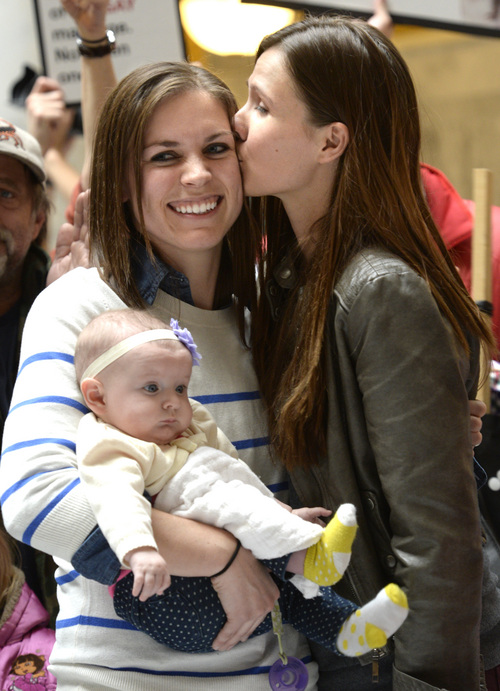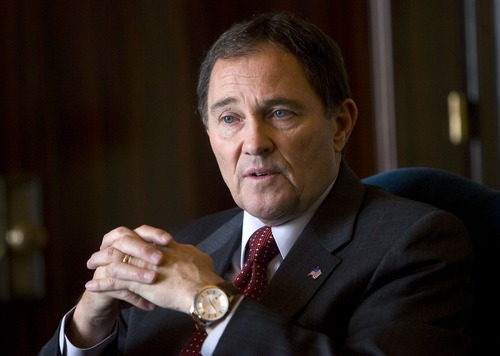This is an archived article that was published on sltrib.com in 2014, and information in the article may be outdated. It is provided only for personal research purposes and may not be reprinted.
Gov. Gary Herbert said Thursday he has a duty to defend Utah's ban on same-sex marriage, but expressed potential flexibility on the issue of civil unions and a statewide ban on housing and employment discrimination against gay Utahns.
Utahns expressed the "will of the people," Herbert said, when they passed Amendment 3 in 2004, banning same-sex marriage. As governor, Herbert said he took an oath to defend the state's constitution and laws.
"We have some states out there that are forgetting that they need to represent the people and taking a pass on defending laws because they pick and choose what is right and wrong. That's not the way it should work," Herbert said.
The attorney general from Virginia said Thursday he would not enforce that state's prohibition on gay marriage, believing it was unconstitutional. Herbert said others, including Gov. Jerry Brown in California, refuse to enforce Proposition 8 banning gay marriage in that state.
"That's a very, dangerous, in fact, footing when we have elected officials picking and choosing which laws they're going to enforce," Herbert said during his monthly news conference at KUED, calling it the "next step to dictatorship."
"We are going to follow the rule of law wherever it takes us," Herbert said.
Utah needs to "put its best foot forward in defending its constitution," Herbert said, adding that he supports the hiring of outside counsel to handle the case, which he noted will cost taxpayers about $300,000 as it goes to the 10th U.S. Circuit Court of Appeals.
"The debate shouldn't be same-sex marriage. It should be states' rights," Herbert said later, but it hasn't been "because you have an activist on the bench."
Herbert again criticized the Dec. 20 decision by U.S. District Judge Robert Shelby, who struck down Utah's Amendment 3 last month and then refused to stay his ruling, allowing hundreds of gay Utah couples to marry. The U.S. Supreme Court issued a stay Jan. 6, creating uncertainty for those couples who wed.
"I have empathy for their plight," Herbert said. "I have empathy for their joy and the confusion that's been created by the Judge Shelby ruling."
Despite holding firm on his position against same-sex marriage, Herbert expressed a willingness to explore other issues — including civil unions for same-sex couples and a statewide ban on housing and employment discrimination against gay Utahns.
Herbert said that, in light of Shelby's ruling, it is an "opportunity to reflect and review" Utah's laws, including whether civil unions might be permissible.
"If there are other ways to get from here to there that can be the common-ground approach and find the proverbial win-win, let's take a look at it," Herbert said.
However, the Republican governor said he believes such civil arrangements are currently barred by Amendment 3 — which forbids any unions that have "substantially equivalent legal effect" as marriage — and the state constitution would have to be changed.
While a recent poll for The Salt Lake Tribune found Utahns were evenly split on whether gay couples should be allowed to marry, 72 percent of those surveyed said they supported civil unions or domestic partnerships.
Such unions are seen by many in the gay community as a "separate-but-equal" arrangement short of marriage.
"It's unfortunate that the chief executive of the State of Utah would waffle over a constitutional amendment that was passed years ago with overwhelming support," said Paul Mero, president of The Sutherland Institute. "It seems like he's got his finger in the wind and that would be unfortunate if that were true."
Mero said he hopes that Herbert was only indicating a willingness to discuss the issue, but understands the problems inherent in the arrangement.
Brandie Balken, executive director with Equality Utah, said that, with the marriage issue pending in the courts, now is probably not the best use of time and energy to debate policies that depend on the outcome of the pending litigation.
Herbert also expressed a willingness to consider a statewide nondiscrimination ordinance, which is being sponsored this year by state Sen. Steve Urquhart, R-St. George.
"I've supported nondiscrimination statutes at our local level and our cities," Herbert said. Currently 18 municipalities and local districts have such ordinances on the books. "The idea of nondiscrimination, I support and endorse. I don't think we should discriminate in the workplace or housing based on sexual orientation, so I support the concept."
Herbert said he would have to see the specifics of Urquhart's legislation before he officially endorses the bill.
Urquhart praised the governor for supporting efforts to prevent discrimination.
"Clearly it's helpful," Urquhart said. "That's the job of a governor, to lead, and the only way to lead is by taking positions on issues. I think this is good leadership on his part and I think he recognizes the will of most Utahns as reflected in poll after poll. I'm proud of him."
Urquhart said he would also like to see The Church of Jesus Christ of Latter-day Saints take a stand on the bill, as the church did in opposing changes to Utah's alcohol policy this week.
"While it is silent, others are speaking on the church's behalf," Urquhart said. "In the void you have Sutherland and others who are rushing in to say that the Mormon church wants the right for its members to individually discriminate against the LGBT individuals and I don't think that's correct."
Mero said he's not convinced there is a problem with housing and workplace discrimination against gay Utahns now — since only three complaints have been filed since Salt Lake City adopted its ordinance in 2009 and all three were dismissed.
"I think it's more Urquhart playing to the gay community and the Sundance crowd and trying out a solution for a problem that doesn't exist," Mero said. "I think Steve is in the business of baiting the LDS Church, because he knows there's no deal on this bill unless the LDS Church signs off on it."
In various concessions and carve-outs to the non-discrimination bill, Mero said that Urquhart has created legalized discrimination in order to win votes and it is wise for Herbert to stop short of endorsing a bill that Mero said is fraught with problems.
Balken, of Equality Utah, praised Herbert's openness on anti-discrimination legislation.
"I think it's important to acknowledge Governor Herbert for being willing to have a meaningful conversation on non-discrimination protections," she said. It is part of a discussion other states are having "and demonstrates a willingness to engage in that conversation in a way that is thoughtful and inclusive and not only speaks well of Governor Herbert, but speaks well of Utah."
Twitter: @RobertGehrke —
Bills aim to protect religious liberty
Sen. Stuart Reid, R-Ogden, and The Sutherland Institute unveiled a series of three bills Thursday evening that they said will protect Utahns' religious freedom, including a requirement that Utah schools teach children about the history of religious liberty.
•One bill mirrors the federal Religious Freedom Restoration Act, which says the state must show it has a compelling interest in order to interfere with someone's practice of their faith or their exercise of their "religious conscience."
• The second would require Utah schools to develop and teach a curriculum on religious freedom.
• And the third would be an alternative to a bill proposed by Sen. Steve Urquhart, R-St. George, that prohibits housing and employment discrimination against gay and lesbian Utahns. Sutherland president Paul Mero said it would prevent punitive action against any employee based on activities outside the workplace that didn't affect job performance.
The text of the bills being drafted are not yet available.





